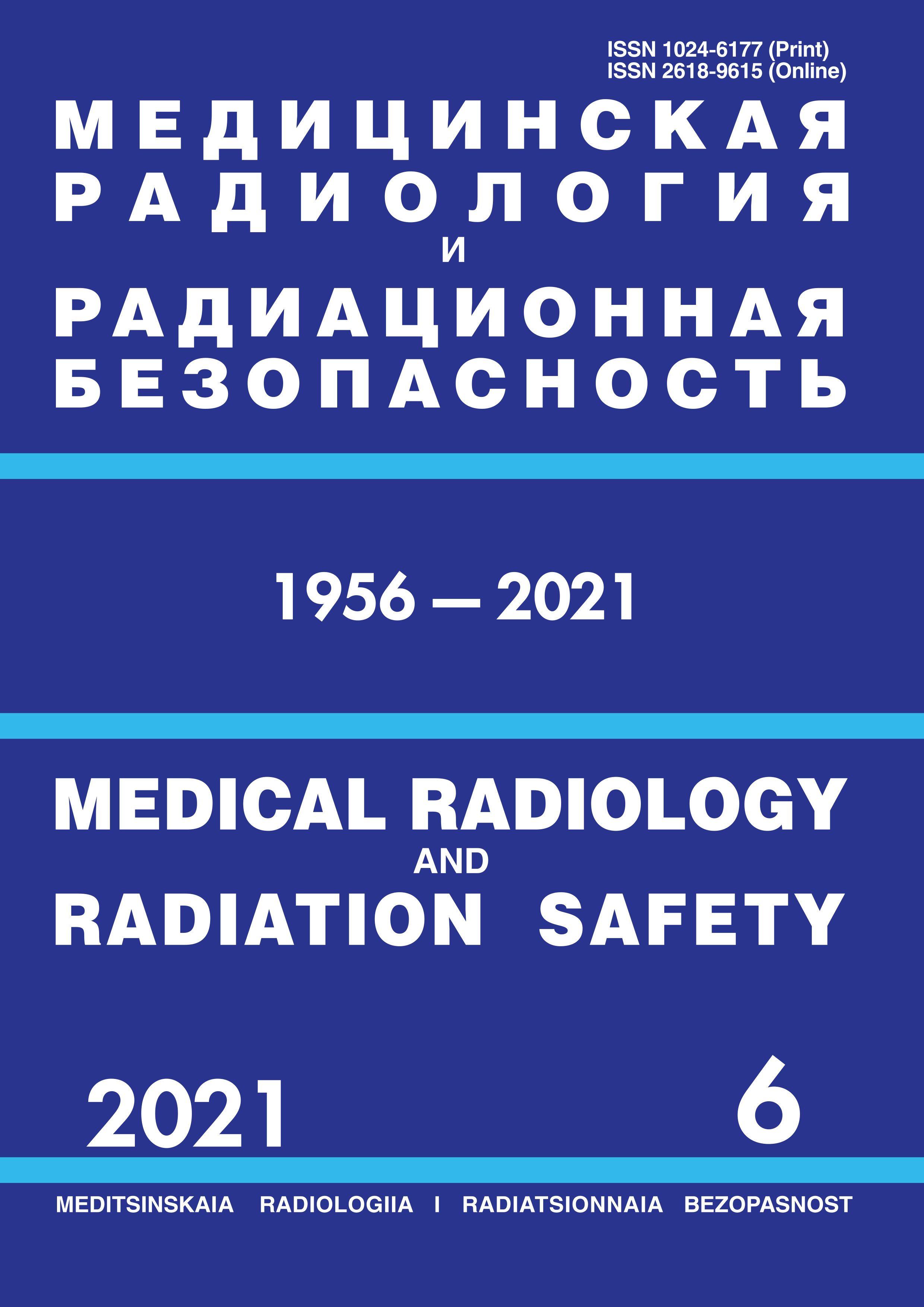CSCSTI 76.33
CSCSTI 76.03
Russian Classification of Professions by Education 31.06.2001
Russian Classification of Professions by Education 31.08.08
Russian Classification of Professions by Education 32.08.12
Russian Classification of Professions by Education 14.04.02
Russian Library and Bibliographic Classification 534
Russian Library and Bibliographic Classification 51
Russian Trade and Bibliographic Classification 5712
Russian Trade and Bibliographic Classification 5734
Russian Trade and Bibliographic Classification 6212
Russian Trade and Bibliographic Classification 5708
Purpose: Brain metastasis (BM) has a significant negative impact on the survival of breast cancer patients. An intensive search is underway for a multi-modal approach to identify the most effective methods of treating such patients. Material and methods: The study included 40 patients with breast cancer who were diagnosed with BM on magnetic resonance imaging (MRI) of the brain. Total brain irradiation (TBI) up to 30 Gy (3 Gy) was used as the main treatment method. The median age was 48 (31–70) years. In 75 % of cases, a nonluminal subtype of breast cancer was found, in 57.5 % of cases–T2 breast cancer, in 70 % of cases–N0-1. Results: The median survival after TBI was 12 months, 6-month survival rate was 70 %, and 12 – month survival rate was 47.5 %. The risk of death was significantly increased (HR=3.309; 95 % CI: 1,184 – 9,250, p=0.023) in patients whose time interval from the manifestation of 1 relapse to BM was ≤24 months. In these patients, the survival was only 9.5 months and was significantly lower (p=0.0136) than in the patients with the same time interval was >24 months – 30 months. Conclusions: It was found that the effectiveness of total brain irradiation in patients with breast cancer brain metastasis is the highest if the time interval from the moment of manifestation of first relapse to brain metastasis is more than 24 months.
breast cancer, brain metastases, total brain irradiation, time interval to brain metastasis, survival
1. Cheng Y, Yan Y, Gong J, Yang N, Nie S. Trends in Incidence and Mortality of Female Breast Cancer During Transition in Central China. Cancer Manag. Res. 2018;10:6247-6255. doi:https://doi.org/10.2147/CMAR.S182510.
2. Torre LA, Bray F, Siegel RL, Ferlay J. Lortet-Tieulent J, Jemal A. Global Cancer Statistics, 2012. CA Cancer J Clin. 2015;65;2:87-108. doi:https://doi.org/10.3322/caac.21262.
3. Lee ES, Jung SY, Kim JY, Kim JJ, Yoo TK, Kim YG, Lee KS, Lee ES, Kim EK, Min JW, Han W, Noh DY, Moon HG. Identifying the Potential Long-Term Survivors among Breast Cancer Patients with Distant Metastasis. Ann. Oncol. 2016;27;5:828-833.
4. Mariotto AB, Zou Z, Zhang F, Howlader N, Kurian AW, Etzioni R. Can We Use Survival Data from Cancer Registries to Learn about Disease Recurrence? The Case of Breast Cancer. Cancer Epidemiol Biomarkers Prev. 2018;27;11:1-10. DOI:https://doi.org/10.1158/1055-9965.EPI-17-1129.
5. Barnhoitz-Sloan JS, Sloan AE, Davis FG, et al. Incidence Proportions of Brain Metastases in Patients Diagnosed (1973-2001) in the Metropolitan Detroit Surveillance System. JCO. 2004;22;14:2865-2872.
6. Tham YL, Sexton K, Kramer R, Hilsenbeck S, Elledge R. Primary Breast Cancer Phenotypes Associated with Propensity for Central Nervous System Metastases. Cancer. 2006;107;4:696-704.
7. Bastos DCA, Maldaun MVC, Sawaya R, Suki D, Lang FF, Brown PD, Rao G, Weinberg JS, Prabhu SS. Biological Subtypes and Survival Outcomes in Breast Cancer Patients with Brain Metastases in the Targeted Therapy Era. Neuro-Oncol. Pract. 2018;5;3:161-169. doi:https://doi.org/10.1093/nop/npx033.
8. Brosnan EM, Anders CK. Understanding Patterns of Brain Metastasis in Breast Cancer and Designing Rational Therapeutic Strategies. Ann. Transl. Med. 2018;6;9:163. doi:https://doi.org/10.21037/atm.2018.04.35.
9. Polivka JJr, Kralickova M, Polivka J, Kaiser C, Kuhn W, Golubnitschaja O. Mystery of the Brain Metastatic Disease in Breast Cancer Patients: Improved Patient Stratification, Disease Prediction and Targeted Prevention on the Horizon? EPMA J. 2017;8;2:119-127. doi:https://doi.org/10.1007/s13167-017-0087-5.
10. Berghoff AS, Bargo-Horvath Z, IIhan-Mutlu A, et al. Brain Only Metastatic Breast Cancer Is a Distinct Clinical Entity Characterized by Favorable Median Overall Survival Time and a High Rate of Long-Term Survival. Br. J. Cancer. 2012;107;9:1454-1458.
11. Ibrahim H, Yaroko AA. Palliative External Beam Radiotherapy for Advanced Breast Cancer Patients with Brain Metastasis in the University College Hospital Ibadan. Ann. Afr. Med. 2019;18;3:127-131. doi:https://doi.org/10.4103/aam.aam_42_18.
12. Duchnowska R, Jassem J, Goswami C, et al. Predicting Early Brain Metastases Based on Clinicopathological Factors and Gene Expression Analisis in Advanced HER2-Positive Cancer Patients. J Neuro-Oncol. 2015;122;1:205-216.
13. Banov SM, Galanov AV, Zaitsev AM, Bekyashev AKh, Vetlovana ER, Durgaryan AA. Metastatic Brain Damage, Modern Treatment Standards. Russian Medical Journal. 2017:16.1181-1185 (In Russ.) [Banov S.M., Golanov A.V., Zaycev A.M., Bekyashev A.H., Vetlovana E.R., Durgaryan A.A. Metastaticheskoe porazhenie golovnogo mozga, sovremennye standarty lecheniya // RMZh. 2017. № 16. S. 1181-1185.].
14. Sperduto PW, Kased N, Roberge D, Xu Z, Shanley R, Luo X, Sneed PK, Chao ST, Weil RJ, Suh J, Bhatt A, Jensen AW, Brown PD, Shih HA, Kirkpatrick J, Gaspar LE, Fiveash JB, Chiang V, Knisely JPS, Sperduto CM, Lin N, Mehta M. Summary Report on the Graded Prognostic Assessment: an Accurate and Facile Diagnosis-Specific Tool to Estimate Survival for Patients with Brain Metastases. J. Clin. Oncol. 2012;30;4:419-425. doi:https://doi.org/10.1200/JCO. 2011.38.0527.
15. Janssen S, Hansen HC, Dziggel L, Schild SE, Rades D. A New Instrument for Predicting Survival of Patients with Cerebral Metastases From Breast Cancer Developed in a Homogeneously Treated Cohort. Radiol. Oncol. 2019;53;2:219-224. doi:https://doi.org/10.2478/raon-2019-0020.
16. Zhang N, Li Q, Xu B, Yuan P, Ma F, Wang J, Fan Y. Breast Cancer Brain Metastases: Clinical and Prognostic Characteristics of Different Biological Subtypes. Zhonghua Zhong Liu Za Zhi. 2014;36;9: 697-702.
17. Badiyan SN, Regine WF, Mehta M. Stereotactic Radiosurgery for Treatment of Brain Metastases. J. Oncol. Pract. 2016;12;8:703-712. doi:https://doi.org/10.1200/JOP.2016.012922.





